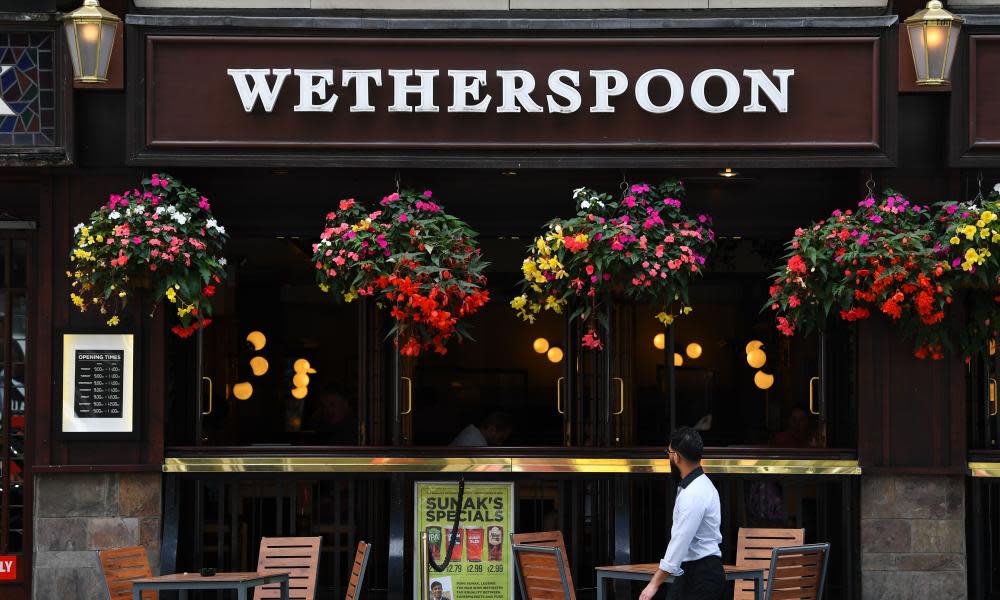Wetherspoon moves to buy up smaller pubs on the cheap amid Covid crisis

Pubs driven to financial ruin by the impact of the pandemic could be bought up on the cheap under plans being drawn up by JD Wetherspoon as well as by a new venture fronted by the former boss of Greene King.
In a statement to investors, Wetherspoon said it was raising up to £93.7m by placing new shares.
It said the money would be used to strengthen a balance sheet damaged by the pandemic and offset the impact of an expected slow start once pubs reopen.
But the 871-strong pub chain said the money would also “facilitate the acquisition of new properties, which are likely to be available at favourable prices, as a result of the pandemic”.
Related: Tell us: has your pub received financial support during the pandemic?
It is targeting pubs in central London, which have been particularly hard-hit due to the loss of tourist traffic and office workers. Many have also been closed for longer than large, rural pubs because they cannot meet social distancing standards.
“It may be possible to achieve a higher-than-average return on capital on properties acquired in the next few years, based on the company’s past experience,” Wetherspoon said.
The chain announced its intentions on the same day that it emerged the former Greene King boss Rooney Anand is leading a new venture ready to spend £200m in a major gamble on recovery for the pubs sector.
Redcat Pub Company has financial backing from an unnamed US-based private equity firm to acquire smaller pubs and bars, City sources told Sky News, which first reported the story.
The opportunity for those with capital to buy venues at knockdown prices comes in the wake of a prolonged period in which the licensed trade has been among the hardest hit by the impact of the coronavirus.
The industry trade body said on Tuesday that parts of the sector were “hanging by a thread” and bemoaned the length of time it was taking for government grants to arrive.
Related: 'How many more lockdowns can we go through?' Bosses on Covid double-dip recession
Nearly three-quarters of the pubs promised a £1,000 grant by the prime minister to help them survive the loss of Christmas sales in England are still waiting for the money, the British Beer & Pubs Association (BBPA) said.
The grants, which local councils have been asked to distribute, were intended to help “wet-led” pubs, which do not serve food and instead rely on alcohol sales, leaving them particularly exposed to Covid-19 restrictions. Venues that did not serve food were unable to open over the traditionally lucrative Christmas period.
default
It was “scandalous” that many of its members were still waiting for cash promised in December 2020, the association said, warning that much of the industry was on the verge of financial ruin.
More than half of the grants introduced to support pubs through the tier restrictions and November lockdown were also yet to be paid.
“Months have passed by yet still thousands of pubs are waiting on the grants they have been promised,” said the BBPA chief executive, Emma McClarkin. “These grants are a vital lifeline, but only when delivered.
“It is unbelievable that so many pubs are still waiting on their Christmas grants and grants for the second lockdown. Considering we are now in a third lockdown it is scandalous.
“Publicans across the country are desperately checking their bank accounts every minute of every day to see if they have got their payment. Our sector is hanging by a thread, so for many pubs getting these grants is the difference between surviving or closing for good.
“The prime minister personally promised some of these grants for wet-led pubs. We implore him to now intervene and ensure his promise is delivered.”
The grants are funded by government and are meant to be distributed by 314 local authorities, each of which have different systems in place for doing so.
The Local Government Association, which represents councils, said some may be prioritising January grants, which are larger and in many cases may be going to the same businesses.
“Councils are working fast to ensure businesses eligible for this funding are able to receive it quickly as possible,” a spokesperson for the association said, adding that its members had distributed £12bn to 880,000 small businesses in grants last year.
McClarkin said central government needed to work with local authorities to ensure the money reached struggling businesses faster.
A government spokesperson said: “We understand these are extremely challenging circumstances for businesses. We are working closely with local authorities, who are responsible for administering these grants, to ensure that funds are paid out as quickly as possible to those that need it.”

 Yahoo Movies
Yahoo Movies 
